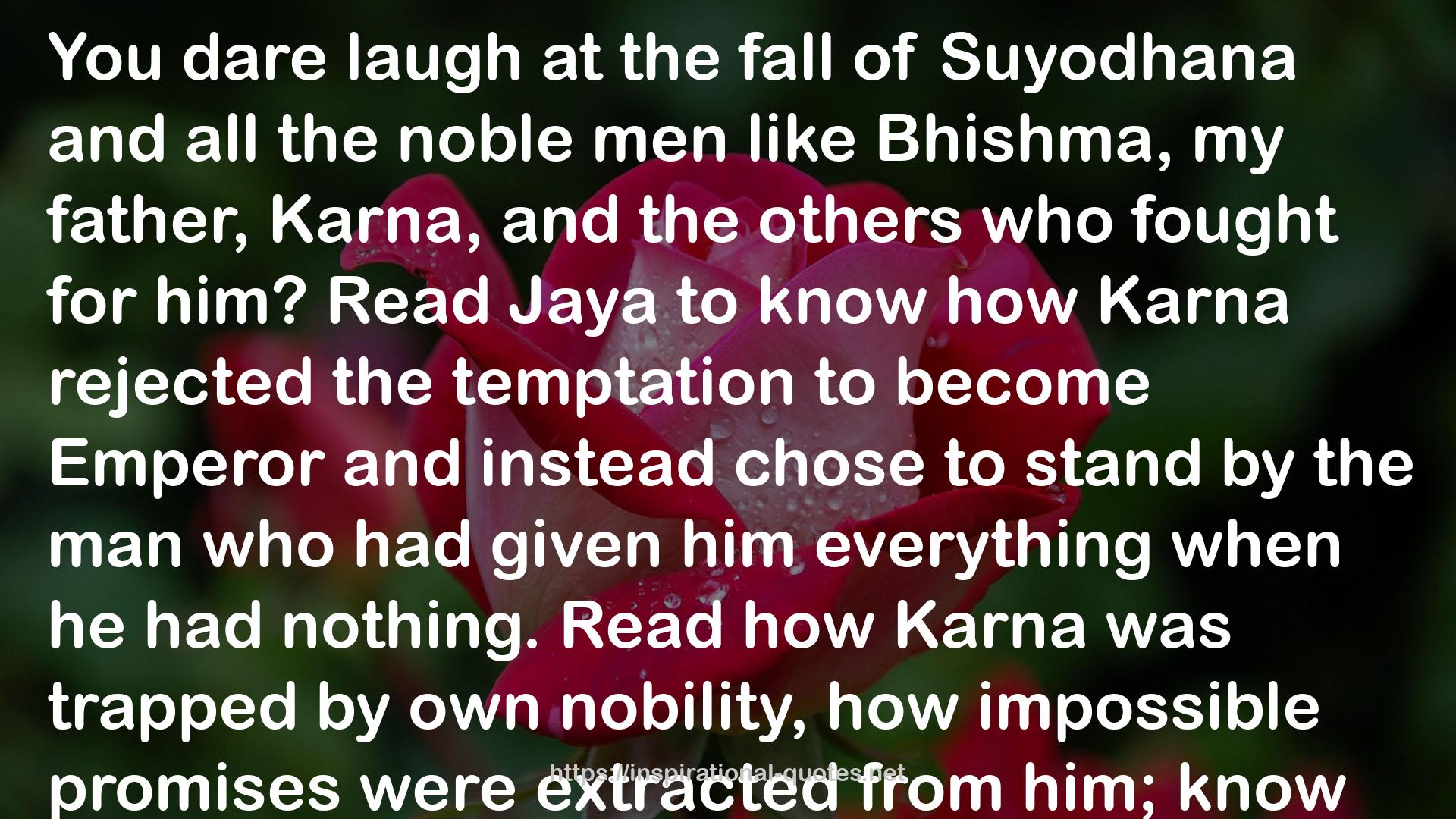1
" You dare laugh at the fall of Suyodhana and all the noble men like Bhishma, my father, Karna, and the others who fought for him? Read Jaya to know how Karna rejected the temptation to become Emperor and instead chose to stand by the man who had given him everything when he had nothing. Read how Karna was trapped by own nobility, how impossible promises were extracted from him; know how he was shot while extracting the wheel of his chariot that was stuck in the mud. Know that Arjuna did not keep his word, as any honourable warrior would have done, when he failed to kill Jayadratha before sunset, hiding behind the lame excuse that the sunset had been maya, an illusion created by an avatar. Sleep in your beds peacefully by all means, if your conscience still allows you to do so, you lucky devils. "
― Anand Neelakantan , Rise of Kali: Duryodhana's Mahabharata (Epic of the Kaurava Clan #2)
3
" Mandana Misra was a great scholar and authority on the Vedas and Mimasa. He led a householder’s life (grihastha), with his scholar-philosopher wife, Ubhaya Bharati, in the town of Mahishi, in what is present-day northern Bihar. Husband and wife would have great debates on the veracity of the Vedas, the Upanishads, the Gita and other philosophical works. Scholars from all over Bharatavarsha came to debate and understand the Shastras with them. It is said that even the parrots in Mandana’s home debated the divinity, or its lack, in the Vedas and Upanishads. Mandana was a staunch believer in rituals. One day, while he was performing Pitru Karma (rituals for deceased ancestors), Adi Shankaracharya arrived at his home and demanded a debate on Advaita. Mandana was angry at the rude intrusion and asked the Acharya whether he was not aware, as a Brahmin, that it was inauspicious to come to another Brahmin’s home uninvited when Pitru Karma was being done? In reply, Adi Shankara asked Mandana whether he was sure of the value of such rituals. This enraged Mandana and the other Brahmins present. Thus began one of the most celebrated debates in Hindu thought. It raged for weeks between the two great scholars. As the only other person of equal intellect to Shankara and Mandana was Mandana’s wife, Ubhaya Bharati, she was appointed the adjudicator. Among other things, Shankara convinced Mandana that the rituals for the dead had little value to the dead. Mandana became Adi Shankara’s disciple (and later the first Shankaracharya of the Sringeri Math in Karnataka). When the priest related this story to me, I was shocked. He was not giving me the answer I had expected. Annoyed, I asked him what he meant by the story if Adi Shankara himself said such rituals were of no use to the dead. The priest replied, “Son, the story has not ended.” And he continued... A few years later, Adi Shankara was compiling the rituals for the dead, to standardize them for people across Bharatavarsha. Mandana, upset with his Guru’s action, asked Adi Shankara why he was involved with such a useless thing. After all, the Guru had convinced him of the uselessness of such rituals (Lord Krishna also mentions the inferiority of Vedic sacrifice to other paths, in the Gita. Pitru karma has no vedic base either). Why then was the Jagad Guru taking such a retrograde step? Adi Shankaracharya smiled at his disciple and answered, “The rituals are not for the dead but for the loved ones left behind. "
― Anand Neelakantan , Rise of Kali: Duryodhana's Mahabharata (Epic of the Kaurava Clan #2)

